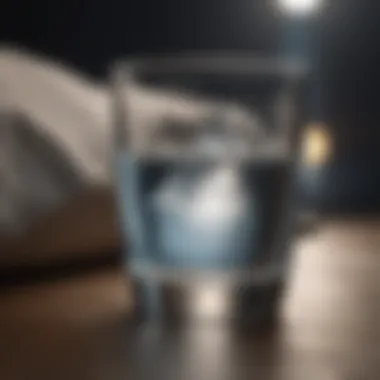Managing Dry Mouth at Night: Understanding Causes and Solutions


Intro
Dry mouth at night, or nocturnal xerostomia, is a condition that affects many people yet often remains undiscussed. This phenomenon can disrupt sleep patterns, leading to a range of physical and psychological health problems. Understanding what causes dry mouth, and identifying practical solutions can significantly improve the quality of one's sleep and overall wellbeing.
In this article, we will explore the various factors contributing to nocturnal xerostomia, including physiological conditions and lifestyle choices. We will also look at associated symptoms and pay attention to a variety of effective solutions, both natural and clinical, to manage this common issue. Recognizing preventive measures will also be a focus, enabling readers to take action before the problem escalates.
Health Benefits
Addressing dry mouth at night brings about various health benefits, both physically and mentally.
Physical Health Benefits
- Improved Sleep Quality: A reduction in dry mouth symptoms often correlates with better, more restorative sleep. This leads to increased energy levels and improved daily functioning.
- Enhanced Oral Health: Maintaining saliva production is crucial for oral hygiene. Saliva helps neutralize acids and wash away food particles, minimizing the risk of tooth decay and gum disease.
- Better Digestive Functions: Saliva plays an essential role in the digestive process by breaking down food. Adequate moisture contributes to smoother and more comfortable digestion, preventing discomfort such as indigestion or acid reflux.
- Strengthened Immune System: Adequate saliva flow is linked to a stronger immune response. It contains antimicrobial components that help combat harmful bacteria in the mouth.
Mental Health Benefits
- Reduced Anxiety Levels: Sufficient sleep and enhanced oral comfort can help lower feelings of anxiety, as individuals do not wake up frequently due to dryness.
- Improved Concentration: A well-rested mind is more focused. With better sleep, cognitive functions, including concentration and memory, can significantly improve.
- Greater Overall Wellbeing: A decreased feeling of discomfort throughout the night leads to a more peaceful mindset, contributing to an overall sense of wellness.
"Saliva plays a critical role in oral health and digestion, making its maintenance vital for overall health and wellness."
Practical Tips
To effectively manage dry mouth at night, adopting certain lifestyle modifications can prove helpful.
Healthy Eating Guidelines
- Stay Hydrated: Drink plenty of water throughout the day. Avoid caffeine and alcohol, especially close to bedtime, as they can exacerbate dryness.
- Opt for Moist Foods: Incorporate moist foods like soups and fruits to increase fluid intake. Avoid salty snacks that may lead to further dehydration.
- Limit Sugary Foods: Sugar can contribute to oral dryness. Choose healthier snacks that promote saliva production, such as nuts or seeds.
Effective Workout Routines
- Gentle Exercise: Engage in light exercises such as walking or yoga. This does not only boost overall health but also promotes better sleep patterns.
- Adequate Breathing: Practicing breath control while performing workouts can be beneficial. Inhale through the nose and exhale through the mouth to help maintain moisture levels.
Prelims to Dry Mouth at Night
Dry mouth at night, or nocturnal xerostomia, is a significant health concern for many individuals. This condition can disrupt sleep and result in various complications. Understanding this issue is crucial because it not only affects personal comfort but also influences overall health. The aim of this section is to delve into the relevance and implications associated with dry mouth during nighttime hours.
Definition of Dry Mouth
Dry mouth, or xerostomia, happens when there is a decrease in saliva production. Saliva is essential for numerous functions, such as aiding digestion, preventing tooth decay, and maintaining oral health. When the mouth becomes dry, the individual may experience discomfort, difficulty swallowing, and an increased risk of dental problems. Nocturnal xerostomia specifically refers to this condition occurring during the night, often when individuals are unaware of the issue as they sleep.
Importance of Saliva Production
Saliva plays a critical role in maintaining oral health. It assists in breaking down food, facilitates swallowing, and offers a protective barrier against harmful bacteria. Saliva also helps keep the mouth moist, which can prevent irritation. If production diminishes at night, several problems may arise. For example, a dry mouth can lead to discomfort upon waking, making it hard to speak or eat in the morning.
"Understanding the importance of saliva can lead to better management strategies for individuals suffering from dry mouth at night."
The interplay between saliva and oral health cannot be understated. Saliva cleanses the mouth, neutralizes acids produced by bacteria, and delivers essential minerals to the teeth. Therefore, maintaining adequate saliva levels is necessary to avoid complications linked to nocturnal xerostomia.
Common Causes of Dry Mouth at Night
Understanding the common causes of dry mouth at night is critical. This condition can significantly affect one’s quality of sleep and overall health. Recognizing the underlying issues paves the way for effective solutions and preventive measures. By identifying these causes, individuals can take proactive steps to manage their symptoms. The next sections detail notable factors contributing to night-time dry mouth.
Dehydration
Dehydration is a primary contributor to dry mouth at night. When the body lacks sufficient fluids, saliva production can diminish. This often occurs due to not drinking enough water throughout the day. Symptoms may manifest more prominently during sleep, leading to discomfort. Individuals may wake up with a parched feeling, struggling to swallow.
Medications
Medications often play a significant role in causing dry mouth. Several types can lead to decreased saliva production, making it important to be aware of them.
Antidepressants
Antidepressants can affect bodily functions, including saliva secretion. Many of these medications lead to xerostomia as a side effect. This reduction in saliva can make swallowing difficult and lead to a sore throat. For individuals struggling with depression, it is crucial to discuss potential side effects with healthcare providers.
Antihistamines
Antihistamines are commonly used to relieve allergy symptoms. However, they too can promote dry mouth. This is due to their action of blocking histamine, which plays a role in stimulating saliva production. While they help alleviate congestion, users might experience a dry sensation in the mouth, making long-term use less favorable for some.


Blood Pressure Medications
Blood pressure medications are another class that can induce dry mouth. Many individuals on these prescriptions find that they do not produce as much saliva. This might lead to complications like difficulty swallowing or taste alterations. The balance between managing blood pressure and the side effects of these medications needs careful attention.
Underlying Health Conditions
Certain health conditions also contribute to dry mouth at night. Recognizing these conditions allows individuals to seek appropriate management strategies.
Diabetes
Diabetes can impact various bodily functions, including saliva production. Those with diabetes are often more prone to dry mouth, especially if blood sugar levels are poorly managed. It is essential to maintain stable glucose levels and remain aware of oral health challenges that accompany this condition.
Sjogren's Syndrome
Sjogren's Syndrome is an autoimmune disorder characterized by dry eyes and mouth. It directly affects the glands that produce saliva, leading to significant discomfort. Awareness of this syndrome is vital for those experiencing chronic dry mouth at night, as proper diagnosis can lead to tailored treatment approaches.
Obstructive Sleep Apnea
Obstructive sleep apnea (OSA) can also exacerbate dry mouth at night. Those with OSA often breathe through their mouths while sleeping due to airway obstruction. This mouth-breathing habit can significantly dry out the oral mucosa, resulting in discomfort. Addressing OSA is crucial to improving sleep quality and mitigating dry mouth symptoms.
Nasal Congestion
Nasal congestion poses another challenge, often forcing individuals to breathe through their mouths. Conditions like allergies, colds, or sinus infections can lead to this situation, contributing to dry mouth at night. Ensuring clear airways can help reduce dependencies on mouth breathing and the subsequent dry mouth symptoms.
Mouth Breathing Habits
Mouth breathing is a significant behavior that impacts oral health. Many individuals may not realize they breathe through their mouths during sleep. This habit can lead to dryness and discomfort, amplifying issues associated with dry mouth. Strategies aimed at developing better breathing habits can prove useful in managing symptoms.
Symptoms Associated with Dry Mouth at Night
Understanding the symptoms associated with dry mouth at night is essential for both recognizing the condition and determining effective management strategies. Symptoms often extend beyond discomfort, impacting overall well-being and the capacity to enjoy restorative sleep. By paying attention to these signs, individuals can take proactive steps to alleviate the condition, enhancing both sleep quality and daily functioning.
Sore Throat
A sore throat can often accompany dry mouth at night. When the mouth is dry, the absence of adequate saliva makes the throat more susceptible to irritation. This may lead to a scratchy or painful sensation that can interfere with swallowing and speaking. The irritation can be exacerbated by breathing through the mouth, which is common for those who experience nasal congestion.
Key Considerations:
- Maintaining hydration throughout the day can help alleviate this symptom.
- Gargling with warm salt water may provide temporary relief.
These actions create better conditions for comfort and can help reduce throat irritation, fostering a more restful sleep.
Bad Breath
Bad breath, or halitosis, is another symptom that can arise from dry mouth at night. Saliva plays a crucial role in controlling bacteria in the mouth. When saliva production is diminished, the balance of bacteria is disrupted, leading to odor. This symptom not only affects personal comfort but also can have social implications.
Approaches to Mitigation:
- Regular oral hygiene practices, such as brushing and flossing, are essential.
- Rinsing with an alcohol-free mouthwash can help control bad breath without further drying the mouth.
Addressing this symptom can enhance self-esteem and comfort in social situations.
Difficulty Swallowing
Difficulty swallowing, also known as dysphagia, can occur when dry mouth limits moisture in the oral cavity. This condition can make swallowing food and liquids uncomfortable or, in some cases, painful. The sensation of food getting stuck can be alarming and may deter individuals from eating properly.
Management Tips:
- Eating small, frequent meals and choosing softer, moist foods can ease the swallowing process.
- Drinking water or using ice chips during meals can also help relieve discomfort.
Awareness and proactive management of swallowing difficulties can greatly improve eating experiences and overall health.
Being cognizant of these symptoms allows for a more effective response to dry mouth, leading to better sleep and day-to-day functioning.
By focusing on these symptoms, individuals can better understand their experiences and make informed decisions regarding their health and lifestyle.
Consequences of Untreated Dry Mouth


Understanding the consequences of untreated dry mouth is crucial in addressing this often overlooked condition. Dry mouth at night can lead to significant repercussions that extend beyond discomfort. This section examines three primary concerns: heightened risk of cavities and oral infections, sleep disturbances, and broader impacts on overall health.
Increased Cavities and Oral Infections
Saliva plays a vital role in oral health. It helps wash away food particles and neutralize acids produced by bacteria in the mouth. When saliva production declines, the mouth becomes more susceptible to cavities and infections. A dry environment, especially at night, allows bacteria to thrive, leading to problems such as tooth decay and gum disease.
People who experience dry mouth might find themselves more prone to the following:
- Cavities: Without adequate saliva, food debris is not cleared effectively from teeth, allowing cavities to form.
- Gingivitis: Lack of moisture can inflame gums, potentially leading to gingivitis, a precursor to more severe gum diseases.
If left untreated, these conditions not only cause discomfort but can lead to more complex medical issues requiring dental intervention.
Sleep Disturbances
Dry mouth can significantly disrupt sleep patterns. Those suffering from this condition may experience increased awakenings during the night due to the discomfort. The need to hydrate can lead to broken sleep, resulting in fatigue during the day. Additionally, sleep apnea may be exacerbated in individuals who primarily breathe through their mouths at night.
This dual threat of dry mouth and disturbed sleep impacts both mental and physical well-being.
Potential effects include:
- Daytime drowsiness: Impairs cognitive functions and decision-making skills.
- Mood changes: Increased irritability and anxiety can arise from chronic sleeplessness.
Impacts on Overall Health
The effects of untreated dry mouth extend beyond the oral and sleep realms. The reduced saliva production can affect digestion. Saliva is essential for the proper breakdown of food; limited saliva may hinder this process, leading to issues such as dietary deficiencies.
Moreover, systemic health may be influenced. Research suggests that individuals with chronic dry mouth face a greater risk for the following:
- Nutritional issues: Difficulty in swallowing can limit food choices, leading to inadequate nutrient intake.
- Respiratory problems: Dry mouth can foster an environment for respiratory infections, as bacteria from the mouth can travel to the lungs.
Addressing dry mouth symptoms through lifestyle changes, medical consultation, or over-the-counter solutions may alleviate some of these risks.
Home Remedies for Dry Mouth Relief
Home remedies play a crucial role in managing dry mouth at night. They can provide immediate relief while also promoting long-term saliva production and oral health. Integrating these remedies into one's routine can enhance quality of life, especially for those whose sleep patterns are disrupted due to nocturnal xerostomia. It is essential to consider these remedies as part of a broader strategy to alleviate symptoms and address the underlying causes of dry mouth.
Staying Hydrated
Staying hydrated is one of the simplest yet most effective ways to combat dry mouth. Water acts as a natural lubricant, aiding in the production of saliva. It is recommended that individuals drink water throughout the day. A general rule is to aim for at least eight 8-ounce glasses of fluids daily, although personal needs can vary. Additionally, carrying a water bottle to bed can provide quick access to hydration during the night.
Remember, adequate hydration can significantly reduce the feeling of dryness and improve overall oral health.
Using Humidifiers
Using humidifiers adds moisture to the air, which can combat dryness in the mouth and throat. When placed in the bedroom, a humidifier can be particularly effective in maintaining an optimal humidity level while sleeping. This is especially beneficial during dry seasons or in environments with artificial heating or cooling. Regular cleaning of the humidifier is necessary to prevent the growth of mold and bacteria, which can worsen oral health issues.
Chewing Sugar-Free Gum
Chewing sugar-free gum stimulates saliva production naturally. As the gum is chewed, the act encourages the salivary glands to work. Look for gums that contain xylitol, as it has additional benefits for dental health. However, moderation is key; excessive chewing may lead to jaw discomfort over time. Choosing gum with a pleasant flavor can also enhance the experience and encourage longer chewing sessions.
Oral Hygiene Practices
Good oral hygiene practices are essential in managing dry mouth. Regular brushing and flossing help maintain an oral environment that supports saliva production. Using fluoride toothpaste can provide additional protection against cavities, which are a significant risk for those with dry mouth. It may also be beneficial to use mouthwash specifically formulated for dry mouth, as these often contain ingredients that help soothe and lubricate the oral cavity. Scheduling regular dental check-ups is also advised to monitor and protect oral health.
In summary, these home remedies provide important tools to manage dry mouth more effectively. Staying hydrated, using humidifiers, chewing sugar-free gum, and practicing good oral hygiene are all essential components that can enhance overall comfort during sleep. Incorporating these practices into daily routines can help mitigate the challenges posed by dry mouth at night.
Over-the-Counter Solutions
Over-the-counter solutions for managing dry mouth at night provide valuable options for individuals experiencing nocturnal xerostomia. Such solutions are easily accessible without the need for prescriptions, making them a convenient first step for many. These products often aim to mimic the natural function of saliva or provide moisture to the oral cavity. It is crucial to consider these solutions not just for immediate relief but also as part of a broader strategy to manage the symptoms of dry mouth effectively.
Saliva Substitutes
Saliva substitutes are specially formulated products designed to hydrate the mouth and mimic the properties of natural saliva. These substitutes can be found in various forms, including gels, sprays, and rinses. The primary function of saliva substitutes is to offer relief from the discomfort caused by dry mouth, especially at night when saliva production tends to decrease.
Some of the benefits include:
- Immediate Relief: Saliva substitutes provide quick moisture, relieving symptoms like dryness and discomfort.
- Ease of Use: Most products are straightforward to apply and can be used before bedtime for more restful sleep.
- Various Options: There are numerous brands available, such as Biotene and Oasis, allowing individuals to choose what works best for them.


While using saliva substitutes, some considerations to keep in mind include ensuring the product is sugar-free to prevent additional issues such as cavities. It is also advisable to read labels to avoid allergens and find formulations that include fluoride for dental protection.
Orthodontic Appliances
Orthodontic appliances designed for dry mouth are another over-the-counter solution worth exploring. These appliances serve as adjuncts to improve comfort and minimize the effects of dry mouth during sleep. Products like mouthguards or specialized dental trays can help with this condition by maintaining moisture levels in the mouth.
Key elements of these appliances include:
- Customized Fit: Many of these devices are tailored to fit comfortably, ensuring they do not cause additional discomfort while sleeping.
- Retention of Moisture: They work by keeping saliva in the mouth, helping to alleviate dryness throughout the night.
- Potential for Oral Health Benefits: Some appliances can help prevent teeth grinding, a common issue among those with sleep disturbances, thereby adding an extra layer of oral health protection.
When considering orthodontic appliances, it is essential to get guidance from a dentist or a dental professional to ensure an appropriate fit and usage that meets personal needs.
In summary, over-the-counter solutions like saliva substitutes and orthodontic appliances present effective and practical options for managing dry mouth at night, making them worth considering for those looking to improve their quality of sleep and overall oral health.
Medical Treatments and Consultation
Medical treatments and consultations play a critical role in managing dry mouth at night, especially when home remedies and over-the-counter solutions have not provided sufficient relief. Many individuals may not recognize the necessity of professional input, but understanding when to seek help can lead to more effective management of this condition. Consulting a healthcare professional allows for a tailored assessment of personal health needs and the identification of underlying causes that may not be apparent. Moreover, expertise in medical treatments guarantees that individuals receive proper guidance on the safest and most effective interventions.
When to See a Doctor
Recognizing the appropriate time to see a doctor regarding dry mouth is essential. Symptoms that persist or worsen might indicate a deeper underlying issue. Consider making an appointment if:
- Dry mouth affects daily activities.
- You notice other symptoms like persistent sore throat, oral infections, or issues with swallowing.
- Home treatments or over-the-counter products fail to relieve symptoms.
- You are taking medications and suspect they might be causing the condition.
Consulting a healthcare provider allows for a comprehensive evaluation, which may involve discussing medical history, conducting physical examinations, and possibly running diagnostic tests. This thorough approach helps in creating a more effective treatment plan tailored to individual circumstances.
Prescription Options
When standard interventions do not alleviate dry mouth, prescription medications can be a viable next step. Healthcare professionals may consider specific pharmaceuticals designed to stimulate saliva production, which can provide substantial relief. Two commonly prescribed medications include Pilocarpine and Cevimeline.
Pilocarpine
Pilocarpine is a notable medication in treating dry mouth disorders. It functions by mimicking the action of acetylcholine, a neurotransmitter that encourages saliva production. This property makes Pilocarpine a beneficial option for individuals suffering from dry mouth resulting from conditions like Sjogren's syndrome. One of the key characteristics of Pilocarpine is that it can be administered in different forms, such as tablets or eye drops, providing versatility in treatment.
Advantages of Pilocarpine include its effectiveness in increasing saliva flow. However, there are disadvantages too; possible side effects may include sweating, nausea, or dizziness, which some individuals find bothersome.
Cevimeline
Cevimeline serves as another prescription option aimed at enhancing saliva secretion. Similar to Pilocarpine, it stimulates muscarinic receptors but offers a unique profile that some patients may tolerate better. One specific advantage is its comparatively better side effect profile, making it a suitable choice for patients who may be sensitive to medications.
Key characteristic of Cevimeline is its targeted action, which reduces the likelihood of systemic side effects associated with broader agents. However, like any medication, it is not without disadvantages, which can include gastrointestinal disturbances in some cases.
By familiarizing yourself with both Pilocarpine and Cevimeline, individuals can have informed discussions with healthcare providers about which medication may be the most suitable option for their unique situations.
Lifestyle Modifications for Prevention
Lifestyle modifications can play a crucial role in managing dry mouth at night. By making certain changes, individuals can alleviate symptoms and improve their overall quality of sleep. The significance of these modifications lies in their ability to target lifestyle factors that contribute to nocturnal xerostomia.
Reducing Alcohol and Caffeine Intake
Alcohol and caffeine can exacerbate dry mouth symptoms. Alcohol is a diuretic, which can lead to increased fluid loss and dehydration. Caffeine has similar effects and can also stimulate the nervous system, potentially affecting saliva production. Therefore, reducing or eliminating these substances, especially in the hours before bedtime, can help maintain adequate hydration overnight.
- Consider alternatives like herbal teas or non-caffeinated beverages.
- If you habitually consume these, try gradually decreasing intake rather than stopping abruptly to avoid withdrawal effects.
Adjusting Sleeping Positions
The way a person sleeps can influence dry mouth occurrence. Certain positions, especially sleeping on one's back, can lead to mouth breathing, which significantly dries out the oral cavity. Adjusting sleeping positions may help alleviate some of this issue. Strategies to consider include:
- Using extra pillows: Elevating the head can promote nasal breathing instead of mouth breathing.
- Side sleeping: This position can naturally encourage breathing through the nose.
These adjustments not only address dry mouth but can also enhance overall sleep quality by making breathing easier and reducing snoring.
Making practical lifestyle changes can be a simple yet effective way to manage dry mouth symptoms during the night. Being mindful of what you consume and how you sleep could lead to better hydration and refreshed mornings.
Finale
Summary of Key Points
- Dry mouth, or nocturnal xerostomia, can disrupt sleep and contribute to long-term oral health issues.
- Common causes include dehydration, medication side effects, snoring, and underlying health conditions such as diabetes.
- Symptoms range from sore throat and bad breath to difficulty swallowing, all affecting daily life.
- Home remedies, over-the-counter products, and medical treatments exist to alleviate discomfort including using humidifiers, staying hydrated, and consulting a healthcare professional for prescription options.
- Lifestyle modifications, such as adjusting diet and sleeping positions, can also serve as preventive measures.
Encouragement for Further Exploration
Further exploration into dry mouth at night can reveal more personalized strategies and techniques for those affected. Engaging with health professionals, wellness coaches, or nutritionists can provide deeper insights tailored to individual needs. Additionally, exploring user forums on platforms like Reddit or Facebook can offer firsthand experiences and support. Such interaction will enhance awareness and understanding, making it easier to confront the challenges posed by nocturnal xerostomia effectively.















